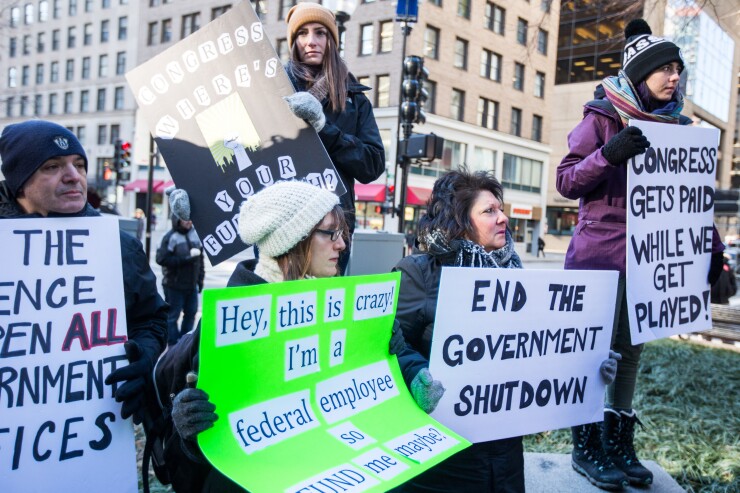Banks and credit unions across the country are waiving fees and offering low- to no-interest loans to help federal workers affected by the partial government shutdown.
U.S. Bancorp on Friday began offering loans between $100 and $6,000 at low rates to qualified federal employees who have an existing U.S. Bank account so they can cover expenses until they return to work.
"We understand the financial pressure that many of our customers who serve our nation are now facing, and we're here to help,” Chairman and CEO Andy Cecere said in a news release.
Many other large and regional banks have taken similar steps. Citigroup, for example, will make adjustments to fees and interest rates to affected customers across several lines of business, a company spokesman said.

Huntington Bancshares in Columbus, Ohio, is automatically waiving overdraft fees on existing accounts that belong to federal workers who are out of work. Refunds on overdrafts will be backdated to Dec. 23 and the policy will remain in effect for the duration of the shutdown. Huntington is also issuing low-rate loans.
“We understand the financial stress created by a government shutdown,” Andy Harmening, director of consumer and business banking at Huntington, said in a news release.
Bank of America said late Friday that it had contacted its customers who are affected by the shutdown to let them know about the bank's assistance programs. lt also donated $10,000 this week to the United Way National Capital Area Emergency Assistance Fund to help federal workers with food, rent and utility payment assistance programs.
The five federal banking regulators issued a joint statement on Friday
That guidance will go a long way to alleviating bankers’ concerns and “will enable banks to do more for their customers impacted by this partial shutdown,” Richard Hunt, CEO of the Consumer Bankers Association, said in a statement Friday.
The shutdown has hurt banks and their customers in many ways. Customers have been unable to obtain mortgage approvals or
The shutdown could eventually inflict damage on banks that are heavily involved in agricultural lending, Brian Martin, an analyst at FIG Partners, wrote in a research note Friday. Farmers are not receiving federal loans or subsidy payments, which they need to help their planning for the upcoming planting season, Martin said. If farmers’ decision-making is impaired, they may grow too much or too little, which could affect their ability to repay loans.
But banks of all sizes are nevertheless pitching in when they can. The $3.5 billion-asset Stockman Bank in Miles City, Mont., will work with customers to restructure their debts, according to
“Your credit card bills from the holidays, another month's house payment are going to be coming up here quickly, those kinds of things, and I think that just is going to make the situation worse the longer it goes,” Stockman CEO Bill Coffee told the radio service. Montana ranks fourth in the U.S. in federal employees as a percentage of the state’s total workforce.
Other institutions located in areas with a concentration of federal employees have announced ways they are helping. The $3 billion-asset Burke & Herbert Bank & Trust in Alexandria, Va., posted a
“We will work with you to provide financial assistance based on your individual circumstances and needs,” Burke & Herbert says in the message.
Credit unions are also helping members. The $168 million-asset Treasury Department Federal Credit Union in Washington is
The $661 million-asset Denali Federal Credit Union in Anchorage, Alaska, is offering
“Denali is proud to serve all of our members, and particularly to assist members who are affected by this partial federal government shutdown, as appropriate,” the credit union says on its website.





